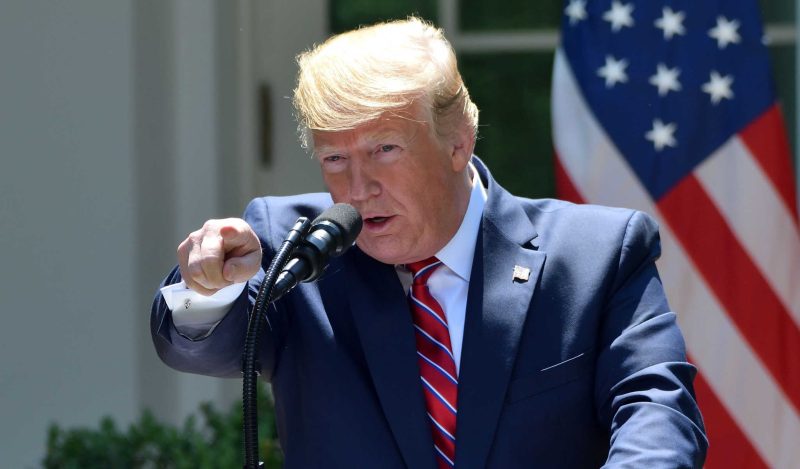The salvos being lobbed between former President Donald Trump and Florida Governor Ron DeSantis over their respective handling of the COVID-19 pandemic are at once troubling, encouraging, and revealing. Citizens who believe in individual liberty, individual responsibility, and constitutional government should listen to what these men and all policymakers are saying about COVID-19 today—and equally important—remember how they responded in 2020.
Causes and Consequences
With global health experts initially warning that the virus was killing 3.4 percent of those infected—and the now-disgraced British epidemiologist Neil Ferguson churning out computer models that offered policymakers a false choice between mass death or mass lockdowns—Trump’s Department of Health and Human Services drafted a document aimed at containing COVID. It was on March 13, 2020.
Stamped “not for public distribution or release” and indeed kept from public view for several months, that document would guide decision-makers at every level of government and every sector of the economy in dealing with COVID-19.
In March 2020, the Trump administration unveiled elements of the document under the banner “15 Days to Slow the Spread.” Among other things, the document introduced us to phrases like “social distancing,” “workplace controls,” “aggressive containment,” and “non-pharmaceutical interventions” at the federal, state, local and private-sector level. These would include “home isolation strategies,” “cancellation of almost all sporting events, performances, and public and private meetings,” “school closures,” and “stay-at-home directives for public and private organizations.”
A PDF sheet handed out at the March 16 press conference said: “In states with evidence of community transmission, bars, restaurants, food courts, gyms and other indoor and outdoor venues where groups of people congregate should be closed.”
This was the blueprint for locking down and closing down our free and open society. With that one sentence, an attempt to nationalize the pandemic response, the Bill of Rights became a dead letter, free association was abolished, and free enterprise itself was put on hold.
It’s no surprise that, when faced with estimates of such a high infection-fatality rate (IFR) and such terrifying computer models, some of the people advising the president would recommend locking down.
What is surprising and telling is that, apparently, the president didn’t respond to those recommendations with questions that would serve to defend individual liberty, encourage individual responsibility and challenge the default position of locking down—questions like: “Haven’t we, as a society, dealt with viruses like this in the past? Didn’t something like this happen in the late 1960s and late 1950s?
What did government do—and not do—back then? How dependable are those IFR numbers? Can we trust those computer models? Are the costs of locking down—economic, societal well-being, individual well-being, constitutional, institutional—worth the benefits? Are there any computer models on that? What are the trade-offs? Is there anything in the scientific canon that challenges this lockdown strategy?”
Americans don’t expect their Presidents to have all the answers. What they expect—and need—from their Presidents is a breadth of knowledge and experience to ask those kinds questions, the capacity to build a diverse team to help answer such questions and to challenge the answers, the ability to instill a sense of calm in the face of chaos, and enough wisdom to navigate a crisis without first worsening it.
Trump did not display any of those characteristics in mid March 2020, which came as no surprise to some of us. There was a revealing moment during the 2016 campaign when Trump was asked, “Who do you talk to for military advice?” Candidate Trump answered, “I watch the shows”—as in the cable-news shouting matches, where the loudest voice or scariest scenario or biggest bang or best one-liner or sharpest elbow or nastiest rejoinder or last word wins. That’s no way to learn about or understand issues of war and peace, life and death. But it revealed much about how a President Trump would respond in a time of crisis.
He seemed to have no intellectual curiosity, no sense of history, no nuance or depth, no wisdom, not a modicum of humility to ask questions. And so, when the COVID crisis slammed into America, Trump was influenced by the last words he heard, impressed by the most maximalist course of action, and drawn to the loudest, biggest-bang advisors—people who had no interest in anything beyond their enclaved neighborhood of expertise, no grasp of the law of unintended consequences, no desire to try to balance public health with individual liberty.
The consequences were devastating—far worse than COVID-19 itself. Aimed at saving life, the lockdowns—ironically but predictably—were a hideous destroyer of life and living. The evidence is literally everywhere: a 25.5 percent increase in alcohol-related deaths, a 30 percent surge in homicides, huge spikes in domestic violence and child abuse, thousands of preventable cancer deaths and heart-disease deaths, decreased life expectancy and decreased earnings for a generation of children, every level of government utterly failed, hundreds of thousands of businesses shuttered, millions left jobless, tens of millions of Americans barred from gathering for worship, the devaluing of work, the expansion of government, the acceleration of dependency.
As a recent study conducted by scientists at Johns Hopkins University and Lund University concludes, the lockdowns were a “policy failure of gigantic proportions…the biggest policy mistake in modern times.”
Yet in the wake of all that wreckage and destruction, we are left to conclude that Trump has no second thoughts, no regrets, no apologies, no lessons learned, no remorse, no sense of responsibility.
While he claims, “I never was for mandates,” and his campaign gushes that “President Trump saved millions of lives, opposed mandates and embraced the federalist system to allow states to make the decisions best for their people,” his record and rhetoric say otherwise.
For example—ignoring factors such as age, comorbidities and population size—Trump recently jabbed, “How about the fact that [DeSantis] had the third most deaths of any state having to do with the China virus? Even [New York Governor Andrew] Cuomo did better.”
He’s comparing here a lockdown state—a state that followed his HHS “guidelines,” quarantined the healthy and tried to control a virus through government coercion—with an individual-liberty state. And he’s applauding the former while criticizing the latter.
“I did the right thing,” he has said about his response to COVID. Almost boasting, he huffs, “We closed the country down…I had to shut down.”
But it wasn’t the right thing to do—not in light of the prescient warnings of people like Donald Henderson, not in light of the Constitution, not in light of history.
He did not have to shut the country down. Other free societies did not imitate the PRC and lock down in response to deadly new viruses—Taiwan, South Korea and Sweden in 2020, America in 1957 and 1968.
And while Trump says he never imposed mandates, his administration drafted and disseminated the blueprint for locking down—a blueprint almost every state followed. If he “had to shut it down,” to use his words, did he do so with gentle suggestions? In fact, Trump himself used the bully pulpit to publicly scold governors for ending lockdowns, especially Georgia Governor Brian Kemp. As Kemp tried to pry open his state after a month of lockdowns, Trump warned him he was “in violation” of the administration’s “phase one guidelines.” This had a chilling effect on other governors who wanted to follow Kemp’s lead. So much for “the federalist system.”
The reality is that by bringing in Scott Atlas—who was using reason and facts to fight the mass psychosis unleashed by the lockdown herd—in August 2020, Trump was tacitly admitting his mistake in handing over the reins of America’s government and economy to unelected public-health officials.
But by then it was too late. In their refusal to allow a return to normalcy and their Orwellian lexicon—“15 days to slow the spread…30 days to slow the spread…the next two weeks are critical…essential workers…together apart…follow the science…six feet apart or six feet under…shelter in place…no mask no service…proof of vaccination required…get the shot and get back to normal”—we were reminded of the human tendency to control other humans, the penetrating potency of fear, and the state’s default desire to expand its reach and role. Once these pathologies are let loose, as they were in March 2020, they are not easily or quickly subdued.
The New Normal
DeSantis—a kind of stand-in for all of us who have a default belief in individual liberty and individual responsibility—initially deferred to Washington’s mandates and threats masquerading as “guidelines.” He says he regrets not challenging Trump and the high priests of scientism from the outset. He deserves credit not only for admitting his initial reaction was wrong, not only for changing course once he recognized what the lockdowns were doing to America and Americans, but also for making this a front-and-center issue today.
Although the Trump camp has resorted to a “My opponent did it too” defense, the New York Times reported in spring 2020 on DeSantis’s “resistance to closures throughout the coronavirus pandemic.” DeSantis reopened and returned his state to normalcy so early that people like Cuomo attacked him: “You played politics with this virus, and you lost,” Cuomo preened in mid-2020. In his backslapping exchange with Trump, Cuomo recently added, “Donald Trump tells the truth…Florida’s policy of denial allowed COVID to spread, and that’s why they had a very large second wave.”
But the numbers tell a different story. “Florida had less excess mortality than California or New York,” as DeSantis points out. Plus, a study conducted by the National Bureau of Economic Research, using CDC data, found free Florida’s age-adjusted COVID deaths per 100,000 (265) to be far lower than locked-down New York’s (346).
“Leaders,” DeSantis argues, “don’t subcontract out their leadership to health bureaucrats like Dr. Fauci.” He bluntly calls “Fauci-ism” and its lockdowns “wrong” and “destructive.” He openly wonders why Trump—best known before his presidency for his trademark tagline “You’re fired!”—couldn’t bring himself to fire Anthony Fauci or at least shut down the White House Coronavirus Taskforce. And he challenges Americans—the tens of millions who were impoverished, broken, left alone by the lockdowns—to wrestle with an unsettling idea: “If [Trump] thinks Cuomo handled it better, that’s an indication if something like this were to happen again, he would double down and do what he did in 2020.”
This isn’t about supporting DeSantis or any other candidate. It’s about discovering who has learned from history and who would repeat the mistakes of March 2020. Every candidate running for every federal office and statewide office should be asked where they stand on this fundamental issue—because there will be other viruses, other pandemics, other computer models that tempt or terrify those in power. In a nation founded on individual liberty and individual responsibility, lockdowns cannot become the new-normal response to such events.
Join the conversation:


Published under a Creative Commons Attribution 4.0 International License
For reprints, please set the canonical link back to the original Brownstone Institute Article and Author.









